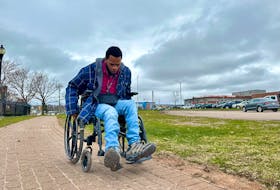SYDNEY, N.S. — The lawyer behind a recently certified class-action lawsuit alleging systemic sexual, physical and mental abuse against children who attended schools for deaf children in Nova Scotia says there are current and former Cape Breton residents among those who have come forward with claims.
The Nova Scotia Supreme Court granted approval last week of the class action related to children who attended the School for the Deaf in Halifax and the Interprovincial School for the Education of the Deaf in Amherst, which was later named the Atlantic Provinces Special Education Authority – Resource Centre for the Hearing Handicapped.
To be certified, the lawsuit had to meet criteria under the province’s Class Proceedings Act, including that there be a cause of action, an identifiable class to serve as a representative party raising a common issue, and they must present a workable method of advancing the class proceeding.

“The reason that the judge has to be satisfied is because there are people that it will impact that are not before the court, and we call them absent class members, and so we have to make sure that the interests of the overall class are being protected,” lawyer Ray Wagner said.
The two defendants — the Attorney General of Nova Scotia and Atlantic Provinces Special Education Authority (APSEA) — initially contested certification, Wagner said, but they subsequently agreed to make some changes to clarify issues that wouldn’t affect the class members.
“With that concession from us they agreed to consent to it,” he said.
While the defendants consented to certification, the action still required the approval of the Nova Scotia Supreme Court, which was obtained Thursday from Justice Patrick Duncan.
Almost 30 members of the class — which consists of all students who attended or resided at the two schools during the period of 1913 to 1995 — attended the court hearing in Halifax, with a sign language interpreter on hand.
There are current and former Cape Bretoners among the more than 235 former students who have come forward alleging abuse to date, although Wagner did not have a ballpark figure immediately available.
Richard Martell and Michael Perrier are the proposed representative plaintiffs, meaning they have been approved to act as representatives of the class.
Wagner said Martell and Perrier have taken a lot of the responsibility of communicating to the deaf community about the proceedings. Wagner’s law firm also uploads to its website explanatory videos with sign language interpretation so class members can follow developments.
“This means a lot to us,” Martell said in a news release.
“We have waited a long time for this day, and it feels good to finally be here,” Perrier said in the release. “Representation from the deaf community in education is needed, and I hope the class action can somehow lead to that.”
The next step will be to meet with Duncan within the next month to set a schedule to get the lawsuit to trial.
“It’s a time when we’re going to file what we’re going to file for the common issues trial, which is a focus on the fault of the defendants, not on the claims of the individuals, that’s the third stage,” Wagner said.
At the same time, he added, they will also look to resolve claims, particularly those that are historic in nature, as older members of the class may die, become disabled or otherwise unable to participate. The province and APSEA haven’t given any indication whether they are interested in settling, Wagner said, noting those discussions don’t normally occur until after certification.
If the class-action is settled — whether a settlement is agreed upon or it goes to trial — there will then be a period where members of the class can submit claims. Wagner said people are most often willing to come forward at that time, as they see it as it being safer for them to do so.
Any member of the class wanting more information on the action can contact Wagner’s law firm by calling 902-425-7330 or toll-free at 1-800-465-8794 or by email [email protected] or [email protected].








